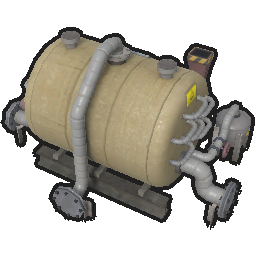Difference between revisions of "Boiler (Gas)"
Thadius856 (talk | contribs) m (implement {{infoicon}}) |
Thadius856 (talk | contribs) m (remove unwanted link params) |
||
| Line 16: | Line 16: | ||
| Variants = [[Boiler (Coal)]]</br>[[Boiler (Electric)]] | | Variants = [[Boiler (Coal)]]</br>[[Boiler (Electric)]] | ||
}} | }} | ||
The '''Boiler (Gas)''' is a machine which creates [[Steam]] from {{infoicon|Water | The '''Boiler (Gas)''' is a machine which creates [[Steam]] from {{infoicon|Water}} using a variety of petrochemical fuel sources. This machine is most commonly used in the early game to reduce the consumption of {{infoicon|Coal}} by replacing [[Boiler (Coal)]] units and instead burning {{infoicon|Heavy Oil}}, {{infoicon|Naphtha}}, though there are additional options available with {{infoicon|Medium Oil}}, {{infoicon|Light Oil}}, and {{infoicon|Fuel Gas}}. In the mid-game, the machine is commonly seen in conjunction with petrochemical processing chains unlocked by the [[Advanced Diesel]] research. | ||
It can also provide power from the burning of {{infoicon|Hydrogen | It can also provide power from the burning of {{infoicon|Hydrogen}} sourced either from the breakdown of {{infoicon|Ammonia}} in an [[Electrolyzer]] or alternatively the splitting of {{infoicon|Water}} in the same. It should be noted that the latter method is a vastly inefficient power source and is net energy negative, but does create small amounts of Water as a byproduct if both [[Low-pressure Turbine]]s and [[Cooling Towers]] are used to recover the {{infoicon|Steam Depleted}}. | ||
==Role in mid-game petrochemical chains== | ==Role in mid-game petrochemical chains== | ||
In mid-game petrochemical processing chains, this machine is often used to burn {{infoicon|Heavy Oil | In mid-game petrochemical processing chains, this machine is often used to burn {{infoicon|Heavy Oil}} to generate {{infoicon|Steam Hi}} which feeds the refinery. One Boiler (Gas) burning Heavy Oil can generate sufficient Steam to fully supply up to two Distillation [[Distillation (Stage I)|Stage I]]'s, [[Distillation (Stage II)|Stage II]]'s, and [[Distillation (Stage III)|Stage III]]'s each plus one [[Sour Water Stripper]], leaving 5% leftover Heavy Oil to be disposed of. This arrangement would need to be initially [[Priming|primed]] using a Boiler (Coal) until sufficient Heavy Oil accumulates to power the Boiler (Gas) full-time at which point its supply can be removed, either by deprioritized the input using a [[Pipe Balancer]], removing its {{infoicon|Water}} source, pausing it, or [[Deconstruction|deconstructing]] it. | ||
Any {{infoicon|Fuel Gas | Any {{infoicon|Fuel Gas}} remaining from conversion to {{infoicon|Diesel}} in the [[Cracking Unit]] and any {{infoicon|Naphtha}} left over from the production of {{infoicon|Rubber}} in the [[Rubber Maker]] need to be removed to prevent the refining system from idling when either output is full. Both products are typically diverted to generate [[Electricity]] using this machine. While [[Flare|flaring]] is an alternative, it produces 25% more [[Air Pollution]] for Naphtha (1.5 Air Pollution/unit vs 2.0 Air Pollution/unit) and 500% more for {{infoicon|Fuel Gas}} (1.0 vs 0.17/unit) than boiling it into Steam Hi, even if the power production is wasted. Thus any excess Heavy Oil from the first boiler should be burned first, then any excess Fuel Gas from Diesel production, then any excess Naphtha from Rubber Production (or later, {{infoicon|Plastic}} or [[Disel]] production). | ||
==Recipes== | ==Recipes== | ||
Revision as of 05:57, 22 January 2022
| Construction | |
| Workers | |
| Electricity | None |
| Maintenance | None |
| Footprint | 5x4 |
| Required Research | Gas Combustion |
| Designation | Water Extraction & Processing |
| Variants | Boiler (Coal) Boiler (Electric) |
The Boiler (Gas) is a machine which creates Steam from Water using a variety of petrochemical fuel sources. This machine is most commonly used in the early game to reduce the consumption of Coal by replacing Boiler (Coal) units and instead burning Heavy Oil, Naphtha, though there are additional options available with Medium Oil, Light Oil, and Fuel Gas. In the mid-game, the machine is commonly seen in conjunction with petrochemical processing chains unlocked by the Advanced Diesel research.
It can also provide power from the burning of Hydrogen sourced either from the breakdown of Ammonia in an Electrolyzer or alternatively the splitting of Water in the same. It should be noted that the latter method is a vastly inefficient power source and is net energy negative, but does create small amounts of Water as a byproduct if both Low-pressure Turbines and Cooling Towers are used to recover the Steam Depleted.
Role in mid-game petrochemical chains
In mid-game petrochemical processing chains, this machine is often used to burn Heavy Oil to generate Steam (High) which feeds the refinery. One Boiler (Gas) burning Heavy Oil can generate sufficient Steam to fully supply up to two Distillation Stage I's, Stage II's, and Stage III's each plus one Sour Water Stripper, leaving 5% leftover Heavy Oil to be disposed of. This arrangement would need to be initially primed using a Boiler (Coal) until sufficient Heavy Oil accumulates to power the Boiler (Gas) full-time at which point its supply can be removed, either by deprioritized the input using a Pipe Balancer, removing its Water source, pausing it, or deconstructing it.
Any Fuel Gas remaining from conversion to Diesel in the Cracking Unit and any Naphtha left over from the production of Rubber in the Rubber Maker need to be removed to prevent the refining system from idling when either output is full. Both products are typically diverted to generate Electricity using this machine. While flaring is an alternative, it produces 25% more Air Pollution for Naphtha (1.5 Air Pollution/unit vs 2.0 Air Pollution/unit) and 500% more for Fuel Gas (1.0 vs 0.17/unit) than boiling it into Steam Hi, even if the power production is wasted. Thus any excess Heavy Oil from the first boiler should be burned first, then any excess Fuel Gas from Diesel production, then any excess Naphtha from Rubber Production (or later, Plastic or Disel production).
